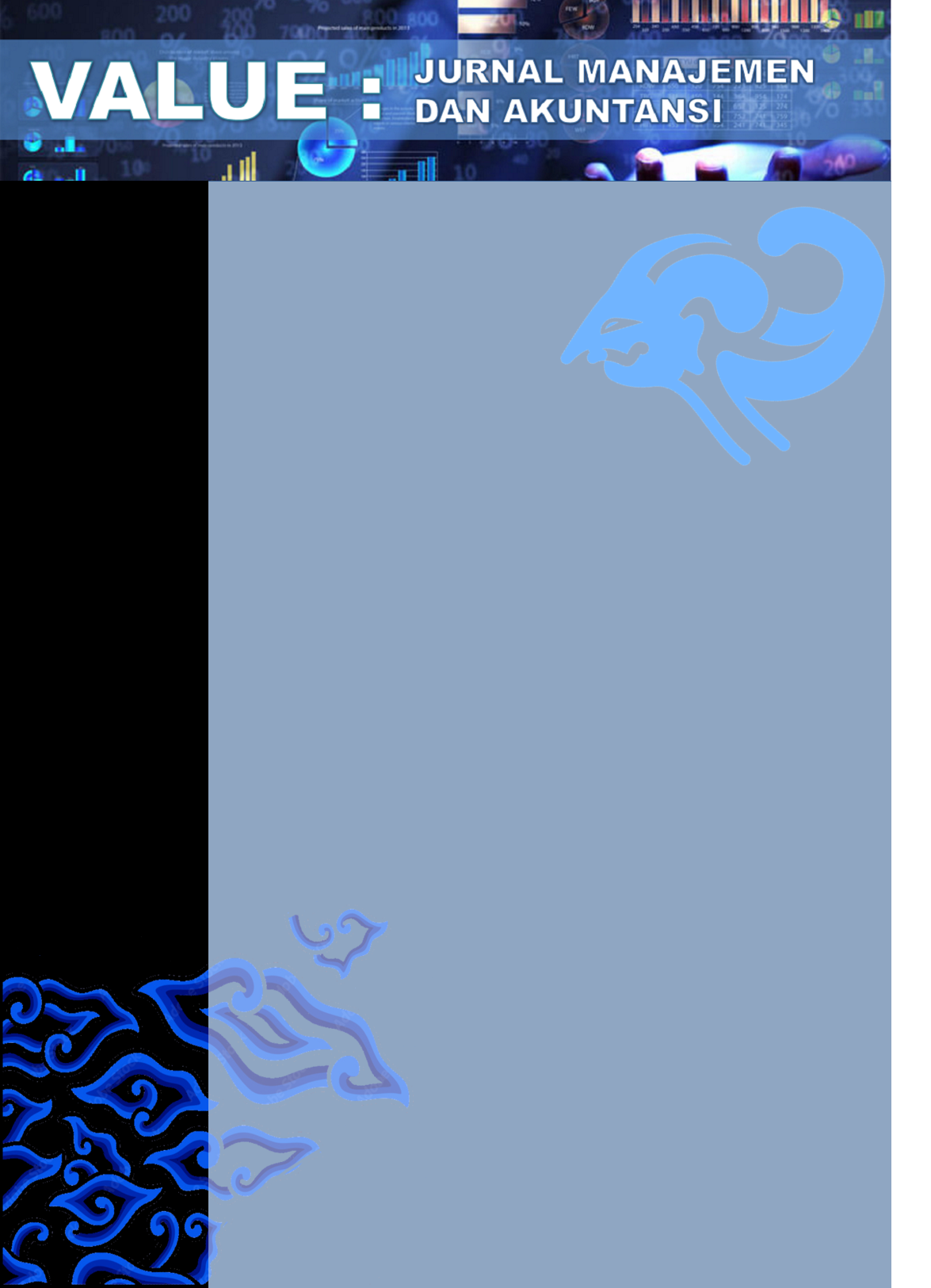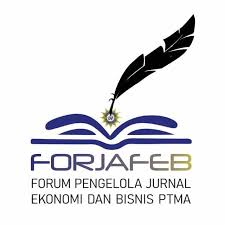Pengaruh Green Organizational Culture Terhadap Competitive Advantages Karyawan: Peran Mediasi Green Innovation Behaviour
DOI:
https://doi.org/10.32534/jv.v19i2.5682Keywords:
Green Organizational Culture, Green Innovation, Competitive AdvantageAbstract
Penelitian ini menguji dan menganalisis pengaruh Green Organizational Culture terhadap Competitive Advantages karyawan: peran mediasi Green Innovation Behaviour pada karyawan di PT. Gunung Sejahtera Puti Pesona di Kalimantan Tengah. Metode penelitian yang digunakan dalam penelitian ini adalah metode penelitian kuantitatif dengan menyebar kuesioner kepada responden. Populasi yang diteliti dalam penelitian ini adalah karyawan PT. Gunung Sejahtera Puti Pesona di Kalimantan Tengah yang berjumlah 190 orang. Metode analisis data yang digunakan dalam penelitian ini adalah Structural Equation Model (SEM) dengan menggunakan Partial Least Square (PLS). Hasil penelitian ini adalah terdapat pengaruh yang positif dan signifikan dari Green Organizational Culture terhadap Green Innovation, terdapat pengaruh yang positif dan signifikan dari Green Organizational Culture terhadap Competitive Advantage, terdapat pengaruh yang positif signifikan dari Green Innovation terhadap Competitive Advantage, dan terdapat pengaruh yang positif dan signifikan dari Green Organizational Culture terhadapi Competitive Advantage di mediasi oleh Green Innovation Behaviour.
References
Aguilera-Caracuel, J. & Ortiz-de-Mandojana, N. (2013) Green Innovation and Financial Performance: An Institutional Approach. Organization & Environment, 26, 365-385.
https://doi.org/10.1177/1086026613507931
Ahmad, S. (2015). Green Human Resource Management: Police and Practices. Cogent Business and Management, 2(1). https://doi.org/10.1080/23311975.2015.1030817
Al-Swidi, A. K., Gelaidan, H. M., & Saleh, R. M. (2021). The joint impact of green human resource management, leadership and organizational culture on employees’ green behaviour and organisational environmental performance. Journal of Cleaner Production, 316, 128112. https://doi.org/10.1016/j.jclepro.2021.128112
Albrecht, S. L., Bocks, A., Dalton, J., Lorigan, A., & Smith, A. (2022). Pro-Environmental Employee Engagement: The Influence of Pro-Environmental Organizational, Job, and Personal Resources. Sustainability, 14(1), 78-90. https://doi.org/10.3390/su14010043
Ali, B. J., & Anwar, G. (2021). An Empirical Study of Employees’ Motivation and Its Influence Job Satisfaction. International Journal of Engineering, Business and Management, 5, 21-30. https://doi.org/10.22161/ijebm.5.2.3
Altmanm, E.I., Hotckiss, E., & Wang, W. (2019). Corporate Financial Distress, Restructuring, And Bankruptcy (Fourth). US: John Wiley & Sons, Inc. Retrieved from https://onlinelibrary.wiley.com/doi/book/10.1002/9781119541929
Ariyanti, F. D., & Andika, A. (2016). Supply Chain Risk Management in the Indonesia Flavor Industry: Case Study from a Multinational Flavor Company in Indonesia. Proceedings of the 2016 Internasional Conference on Industrial Engineering and Operations Management, 1448-1455. Retrieved from http://ieomsociety.org/ieom_2016/pdfs/401.pdf
Asadi, S., Pourhashemi, S. O., Nilashi, M., Abdullah, R., Samad, S., Yadegaridehkordi, E., Aljojo, N., Razali, N. S. (2020). Investigating influence of green innovation on sustainability performance: A case on Malaysian hotel industry. Journal of Cleaner Production, 10, 120860. https://doi.org/10.1016/j.jclepro.2020.120860
Bai, Y., Song, S., Jiao, J., & Yang, R. (2019). The impacts of government R&D subsidies on green innovation: Evidence from Chinese energy-intensive firms. Journal of Cleaner Production, 233, 819-829. https://doi.org/10.1016/j.jclepro.2019.06.107
Bansal, P. (2003). From Issues to Actions: The Importance of Individual Concerns and Organizational Values in Responding to Natural Environmental Issues. Organization Science, 14(5), 510–527. http://www.jstor.org/stable/4135146
Caroline, A., & Devie. (2014). Pengaruh Organizational Culture Terhadap Entrepreneurial Intensity dan Supply Chain Integration dalam Rangka memperoleh Competitive Advantage pada Perusahaan Jasa Keuangan di Surabaya. Business Accounting Review, 160-174. Retrieved from https://media.neliti.com/media/publications/189948-ID-none.pdf
Chandra, K., Arafah, W., & Basri, Y. Z. (2021). Analysis of the e?ect of green organizational culture on organizational performance and competitive advantages of green through green innovation in manufacturing industries. Journal of Hunan University, 48(6), 112. Retrieved from http://jonuns.com/index.php/journal/article/view/596
Chang, C.L.-h. and Lin, T.-C. (2015). The role of organizational culture in the knowledge management process, Journal of Knowledge Management, 19(3), 433-455. https://doi.org/10.1108/JKM-08-2014-0353
Chang, C. H., Qiu, J., O'Sullivan, D., Buck, M. D., Noguchi, T., Curtis, J. D., Chen, Q., Gindin, M., Gubin, M. M., van der Windt, G. J., Tonc, E., Schreiber, R. D., Pearce, E. J., & Pearce, E. L. (2015). Metabolic Competition in the Tumor Microenvironment Is a Driver of Cancer Progression. Cell, 162(6), 1229–1241. https://doi.org/10.1016/j.cell.2015.08.016
Chen, Y., Lai, S., & Wen, C. (2006). The Influence of Green Innovation Performance on Corporate Advantage in Taiwan. Taiwan Journal, 67, 331-339. https://link.springer.com/article/10.1007/s10551-006-9025-5
Cheung, C. M. K., & Thadani, D. R. (2012). The impact of electronic word-of-mouth communication: A literature analysis and integrative model. Decision Support Systems, 54(1), 461-470. https://doi.org/10.1016/j.dss.2012.06.008
Creswell, J.W. (2008). Educational Research: Planning, Conducting, and Evaluating Quantitative and Dualitative Research. Pearson Merrill Prentice Hall, 87-103.
Danirmala, L., & Prajogo, W. (2022). The mediating role of green training to the influence of green organizational culture to green organizational citizenship behavior and green employee involvement. IJHCM (International Journal of Human Capital Management), 6(1), 66-75. https://doi.org/10.21009/IJHCM.06.01.6
García-Machado, J. J., & Martínez-Ávila, M. Environmental Performance and Green Culture: The Mediating Effect of Green Innovation. An Application to the Automotive Industry. Sustainability, 11(8), 1-18. https://doi.org/10.3390/su11184874
Gürlek, M., & Tuna, M. (2018). Reinforcing competitive advantage through green organiza- tional culture and green innovation. The Service Industries Journal, 38(7–8), 467–491. https://doi.org/10.1080/02642069.2017.1402889
Harriss, L., & Crane, A. (2002). The Greening of Organizational Culture: Management View of the Depth, Degree, and Diffusion of Change. Journal of Organizational Change Management, 214-234. https://doi.org/10.1108/09534810210429273
Hair, J.F., Wolfinbarger, M., Moey, A.H., Samuel, P., & Page, M.J. (2015). Essentials of Business Research Methods. 2nd edition. New York Routledge. https://doi.org/10.4324/9781315704562
Hermundsdottir, F., & Aspelund, A. (2022). Competitive Sustainable Manufacturing - Sustainability Stategies, Enviromental, and Social Innovations, and Their Effect on Firm Performance. Journal of Cleaner Production, 219-240. https://doi.org/10.1016/j.jclepro.2022.133474
Huang, J. W., & Li, Y, H. (2017). Green Innovation and Performance: The View of Organizational Capability and Social Reciprocity. Journal of Business Ethics, 145(2), 309-324. https://doi.org/10.1007/s10551-015-2903-y
Imran, M., & Jingzu, G. (2022). Green organizational culture, organizational performance, green innovation, environmental performance: A mediation-moderation model. Journal of Asia-Pacic Business, 23(2), 161-182. https://doi.org/10.1080/10599231.2022.2072493
Imran, M., Arshad, I., & Ismail, F. (2021). Green Organizational Culture and Organizational Performance: The Mediating Role of Green Innovation and Environmental Performance. Jurnal Pendidikan IPA Indonesia, 10(4), 515-530 https://journal.unnes.ac.id/nju/jpii/article/view/32386
Kotler, P., & Armstrong, G. (2018). Principles of Marketing (17th ed.). The University of Minnesota Libraries Publishing. Retrieved from https://open.lib.umn.edu/principlesmarketing/
Küçüko?lu, & P?nar. (2016). The Mediating Role of Green Organizational Culture Between Sustainability and Green Innovation: A Research in Turkish Company. PrePrints, 266-278. Retrieved from https://www.preprints.org/manuscript/201611.0122/v1
Leonanda, B. D. (2019). Masalah Lingkungan, Pemanasan Global, dan Masa Depan Industri Kelapa Sawit Indonesia. Edisi Khusus: Prosiding Seminar Nasional Keinsinyuran 2019, Buletin Profesi Insinyur, 2(3). 102-107. Retrieved from http://buletinppi.ulm.ac.id/index.php/bpi/article/viewFile/50/52
Leonidou, L. C., Fotiadis, T. A., Christodoulides, P., Spyropoulou, S., & Katsikeas, C. S. (2015). Environmentally Friendly Export Business Strategy: Its Determinants and Effects on Competitive Advantage and Performance. International Business Review, 24, 798-811.
https://doi.org/10.1016/j.ibusrev.2015.02.001
Li, S., Ragu-Nathan, B., Ragu-Nathan, T. S., & Rao, S. S. (2006). The impact of supply chain management practices on competitive advantage and organizational performance. Omega, 34(2), 107-124. https://doi.org/10.1016/j.omega.2004.08.002
Lin, R. J., Chen, R. H., & Huang, F. H. (2014). Green innovation in the automobile industry. Industrial Management & Data Systems, 114(6), 886–903. https://doi.org/10.1108/IMDS-11-2013-0482.
Molina-Azorín, Tarí, Pereira-Moliner, López-Gamero, & Pertusa-Ortega. (2015). The Effects of Quality and Environmental Management on Competitive Advantage: A Mixed Methods Study in the Hotel. Science Direct, 11-23. https://doi.org/10.1016/j.tourman.2015.01.008
Mondy, R. W. D., & Martocchio, J. J. (2016). Human Resource Management, 14 Edition. Pearson
Nanath, K., & Pillai, R. (2014). Green information technology: Literature review and research domains. Journal of Management Systems,24(1), 57–79
Negny, S., Belaud, J. P., Robles, G. C., Reyes, E. R., Ferre, J. B. (2012). Toward an eco-innovative method based on a better use of resources: application to chemical process preliminary design. Journal of Cleaner Production, 32, 101-113. https://doi.org/10.1016/j.jclepro.2012.03.023
Norifumi, K., Roger, S., & Antonella, Z. (2018). Stakeholder Pressures, EMS Implementation, and Green Innovation in MNC Overseas Subsidiaries. International Business Review, 11.
Norton, T. A., Zacher H., Ashkanasy N. M. (2015). Pro-environmental organizational culture and climate. In Robertson J. L., Barling J. (Eds.), The psychology of green organizations (pp. 322-348). New York, NY: Oxford University Press
Oxborrow, L., & Brindley, C. (2013). Adoption of "eco-advantage" by SMEs: Emerging opportunities and constraints. European Journal of Innovation Management, 16(3), http://dx.doi.org/10.1108/EJIM-09-2011-0079
Peng, X., & Liu, Y. (2016). Behind eco-innovation: Managerial environmental awareness and external resource acquisition. Journal of Cleaner Production, 139, 347-360. https://doi.org/10.1016/j.jclepro.2016.08.051
Porter, M. (1990). The Competitive Advantage of Nations. Harvard Business Review, 2(68), 73-93.
Prud'homme, B., Raymond, L. (2013). Sustainable development practices in the hospitality industry: An empirical study of their impact on customer satisfaction and intentions. Internasional Journal of Hospitality Management, 34, 116-126. https://doi.org/10.1016/j.ijhm.2013.03.003
Puspasari, N. E. F. (2020). Pengaruh Green Innovation terhadap Kinerja Inovasi dan Keunggulan Kompetitif yang dimediasi oleh Managerial Environmental Concern (Studi Kasus pada UMKM Batik di Yogyakarta). Skripsi Universitas Islam Indonesia. Retrieved from https://dspace.uii.ac.id/handle/123456789/28305
Qi, G., Zeng, S., Li, X. and Tam, C. (2012) Role of Internalization Process in Defining the Relationship between ISO 14001 Certification and Corporate Environmental Performance. Corporate Social Responsibility and Environmental Management, 19, 129-140. https://doi.org/10.1002/csr.258
Rahman, I., Park, J., & Chi, C. G.-q. (2015). Consequences of “greenwashing”: Consumers’ reactions to hotels’ green initiatives. International Journal of Contemporary Hospitality Management, 27(6), 1054–1081. https://doi.org/10.1108/IJCHM-04-2014-0202
Ravasi, D., & Schultz, M. (2006). Responding to Organizational Identitiy Threats: Exploring the Role of Organizational Culture. Academy of Management Journal, 433-458. Retrieved from https://www.jstor.org/stable/20159775
Robert, G. E., Ioannis, I., & George, S. (2014). The Impact of Corporate Sustainability on Organizational Processes and Performance. Management Science, 60(11), 2835-2857, https://dx.doi.org/10.2139/ssrn.1964011
Scholz, P & Voracek. J. (2016). Organizational Culture and Green Management: Innovative Way ahead in Hotel Industry. ResearchGate, 211-217.
Sepahvand, R., Nazarpoori, A., Sepahvand, M., & Arefnezhad. M. (2022). The Effect of Green Human Resource Management Measures on Green Innovation Through the Mediating Role of Green Organizational Culture: A Case Study of Managers and Experts of Small Waste Processing Companies. Organizational Culture Management, 20(1) 209-215. https://doi.org/10.22059/jomc.2020.292975.1007939
Song, W., & Yu, H. (2017). Green Innovation Strategy and Green Innovation: The Roles of Green Creativity and Green Organizational Identity. Corporate Social Responsibility and Environmental Management, 25(2), 135-150, https://doi.org/10.1002/csr.1445
Tabah, R., & Dwi, H. (2021). Environmental Responsibility, Green Innovation, Firm Value: Asean-5. Journal of Internatinal Conference Proceedings, 4(3), 465-470. https://dx.doi.org/10.32535/jicp.v4i3.1349
Tahir, R., Athar, M. R., Faisal, F., Shahani, N. U. N., & Solangi. B. (2019). Green Organizational Culture: A Review of Literature and Future Research Agenda. International Association of Educators and Researchers (IAER), 147-160. https://doi.org/10.33166/ACDMHR.2019.01.004
Tariq, A., Badir, Y. F., Tariq, W., Bhutta, U. S. Drivers and consequences of green product and process innovation: A systematic review, conceptual framework, and future outlook. Technology in Society, 51, 8-23. https://doi.org/10.1016/j.techsoc.2017.06.002
Thomas, M. J., & Jeffrey, S. H. (2018). How Applying Instrumental Stakeholder Theory Can Provide Sustainable Competitive Advantage. UR Scholarship Repository, 373-385. Academy of Management Review, 43(3), 371-391. https://doi.org/10.5465/amr.2016.0111
Triguero, A., Moreno-Mondéjar, L., & Davia, M. A. (2013). Drivers of different types of eco-innovation in European SMEs. Ecological Economics, 92, 25-233. https://doi.org/10.1016/j.ecolecon.2013.04.009
Tu, Y., & Wu, W. (2021). How does green innovation improve enterprises’ competitive advantage? The role of organizational learning. Sustainable Production and Consumption, 26, 504-516. https://doi.org/10.1016/j.spc.2020.12.031
Wahyuningsih. (2020). Analisis Pengaruh Budaya Hijau Organisasi terhadap Kinerja Hijau dan Keunggulan Kompetitif dengan Mediasi Inovasi Hijau pada PT. Arion Tech Indonesia. Skripsi, Universitas Trisakti. Retrieved from http://repository.trisakti.ac.id/usaktiana/index.php/home/detail/detail_koleksi/0/SKR/judul/00000000000000100758/
Wang, C.-H. (2019). How organizational green culture influences green performance and competitive advantage: The mediating role of green innovation, Journal of Manufacturing Technology Management, 30(4), 666-683. https://doi.org/10.1108/JMTM-09-2018-0314
Wong, W. P. (2014). Total Quality Management & Business Excellence A Business Process Management Capabilities Perpective on Organization Performance. International Journal of Academic Research in Business and Social Sciences, 10(12), 37-41. http://dx.doi.org/10.6007/IJARBSS/v10-i12/8367
Yusoff, Y. M., Nejati, M., Kee, D. M. H., & Amran, A. (2020). Linking Green Human Resource Management Practices to Environmental Performance in Hotel Industry. Global Business Review, 21(3), 663-680. https://doi.org/10.1177/0972150918779294


















